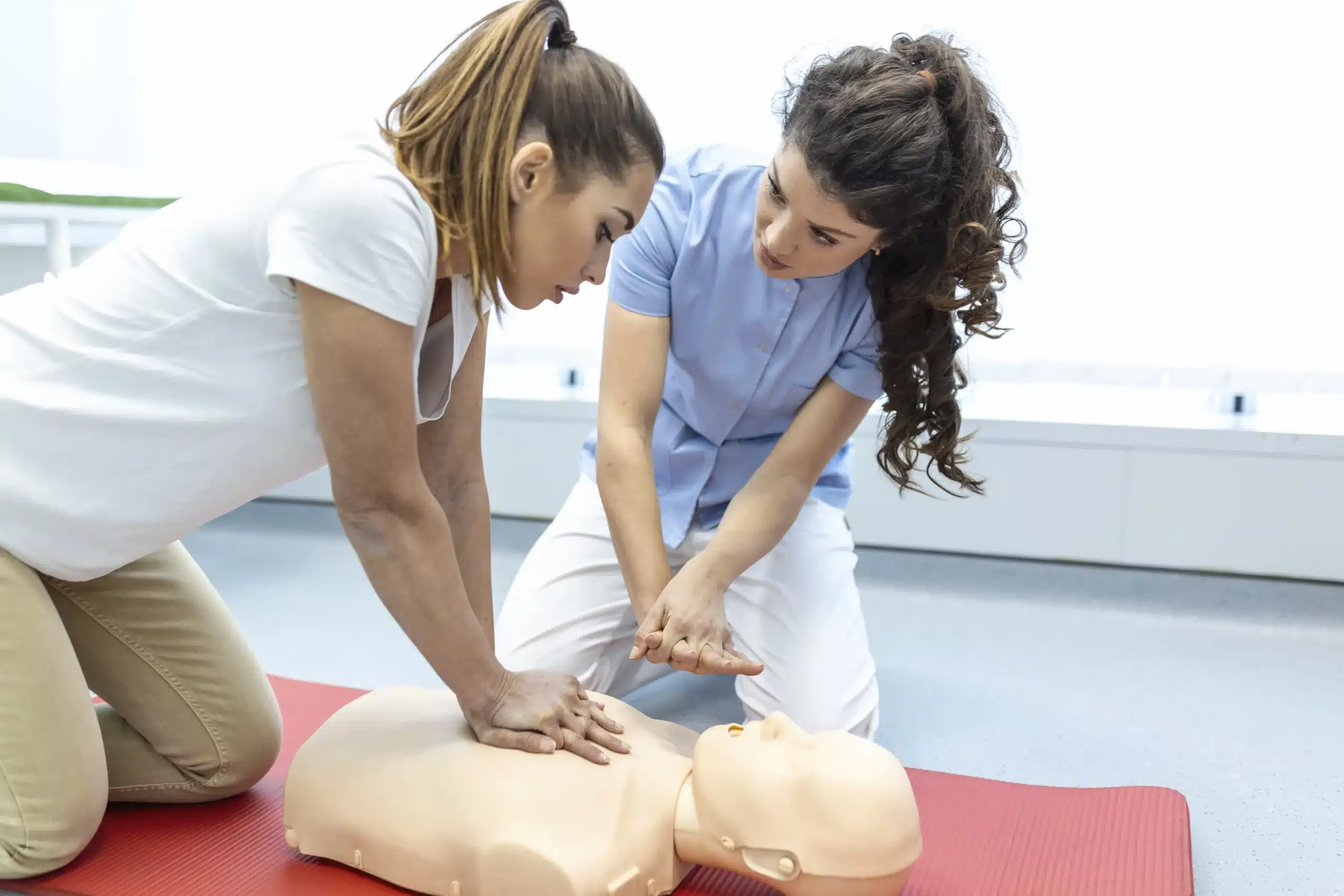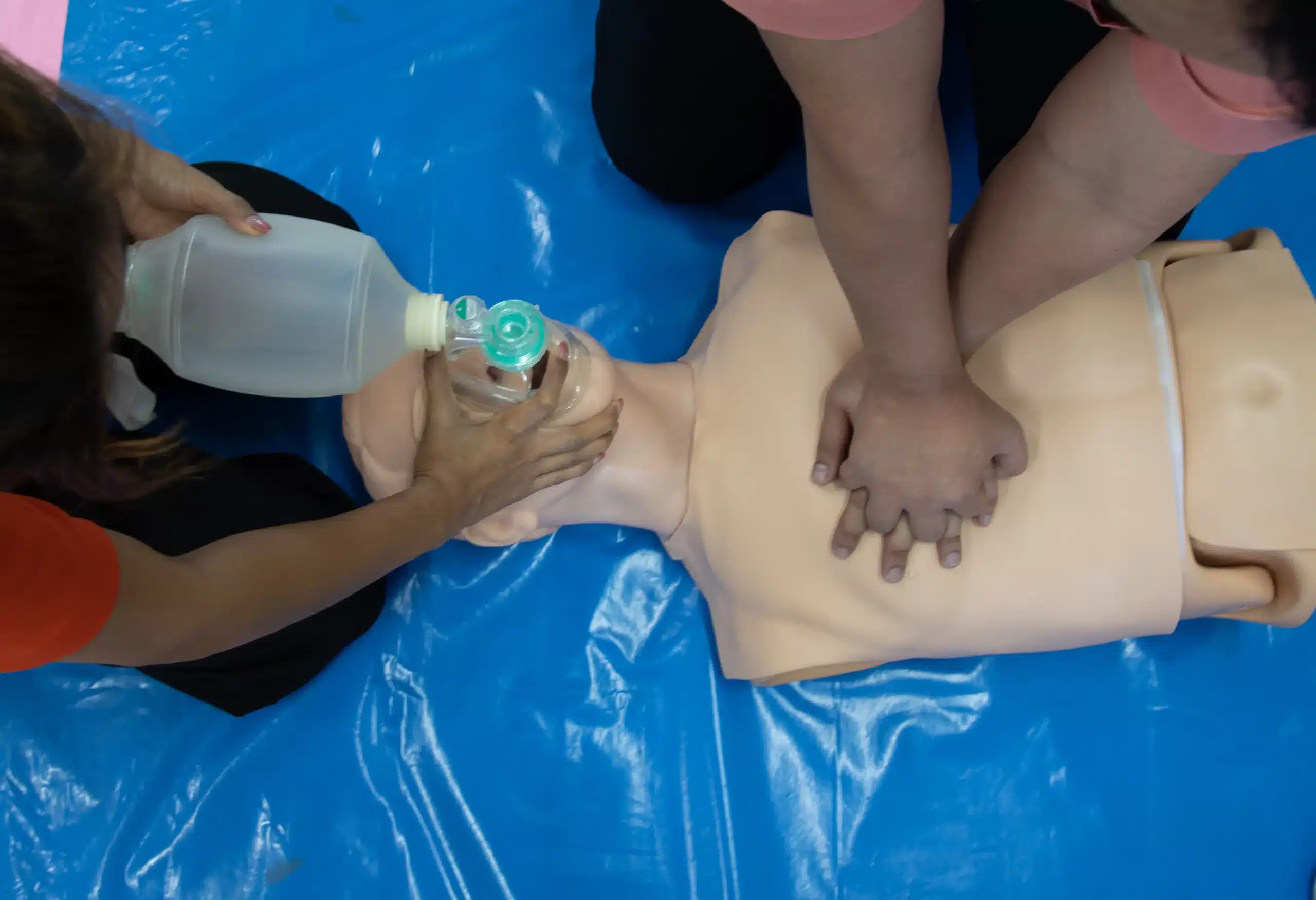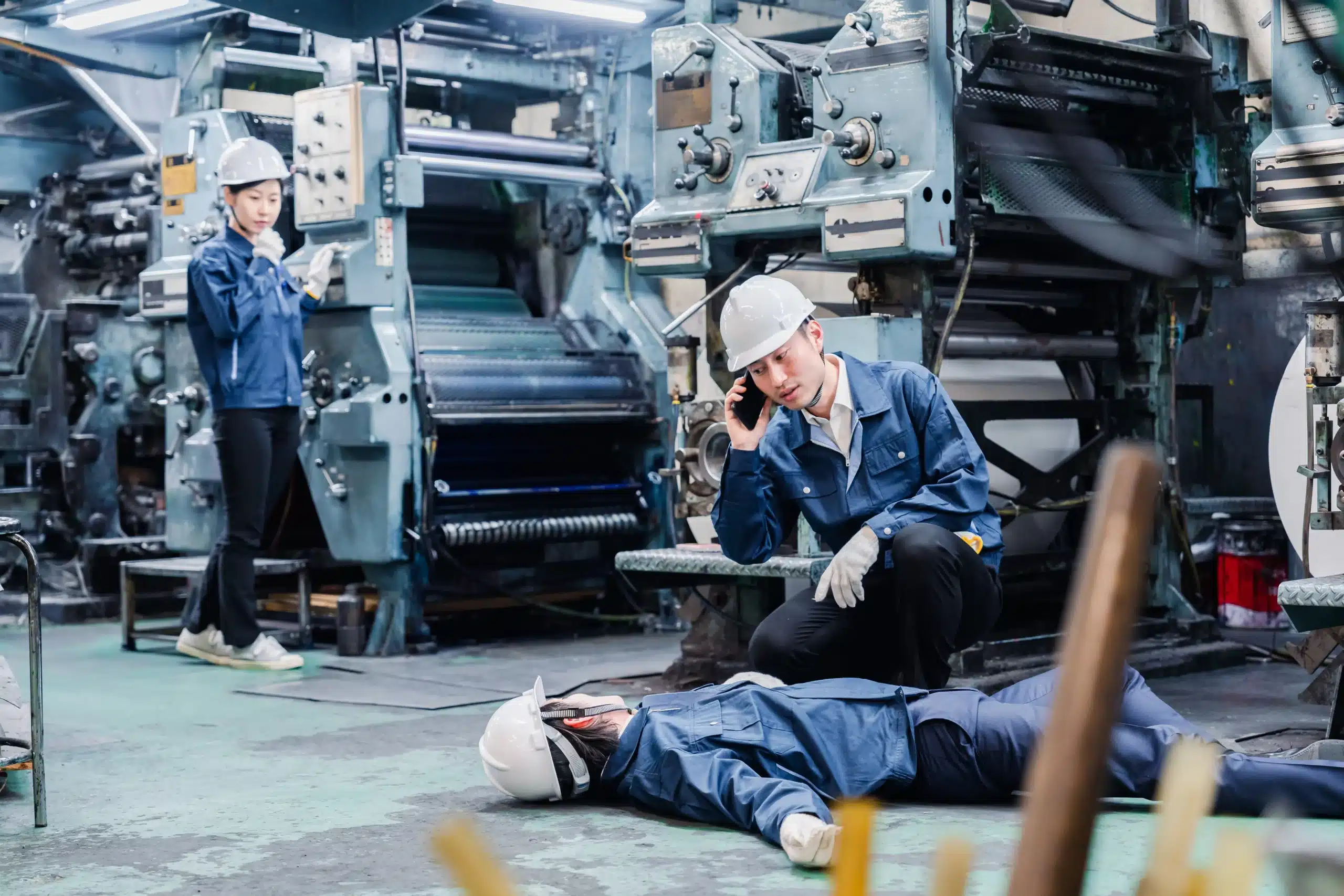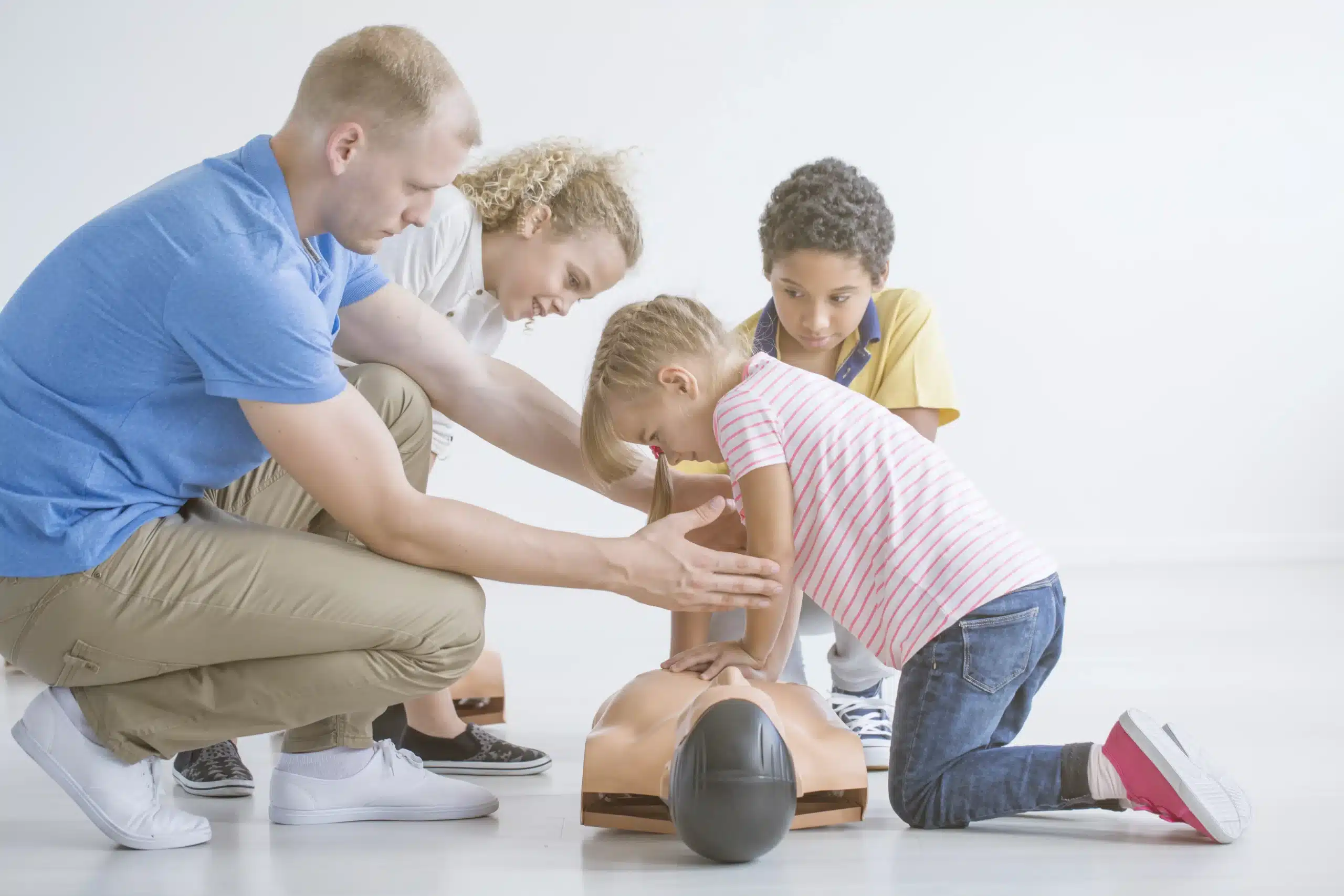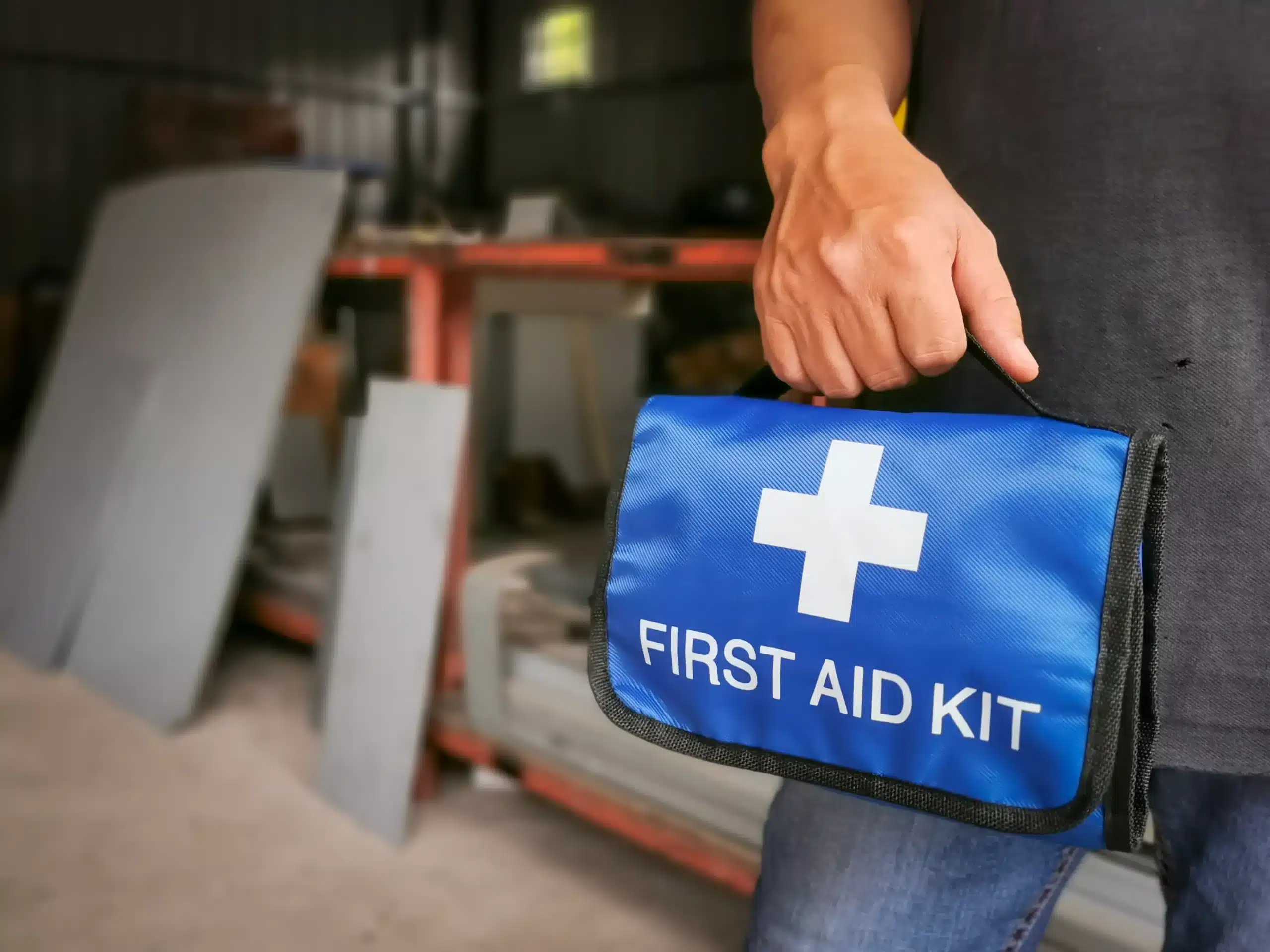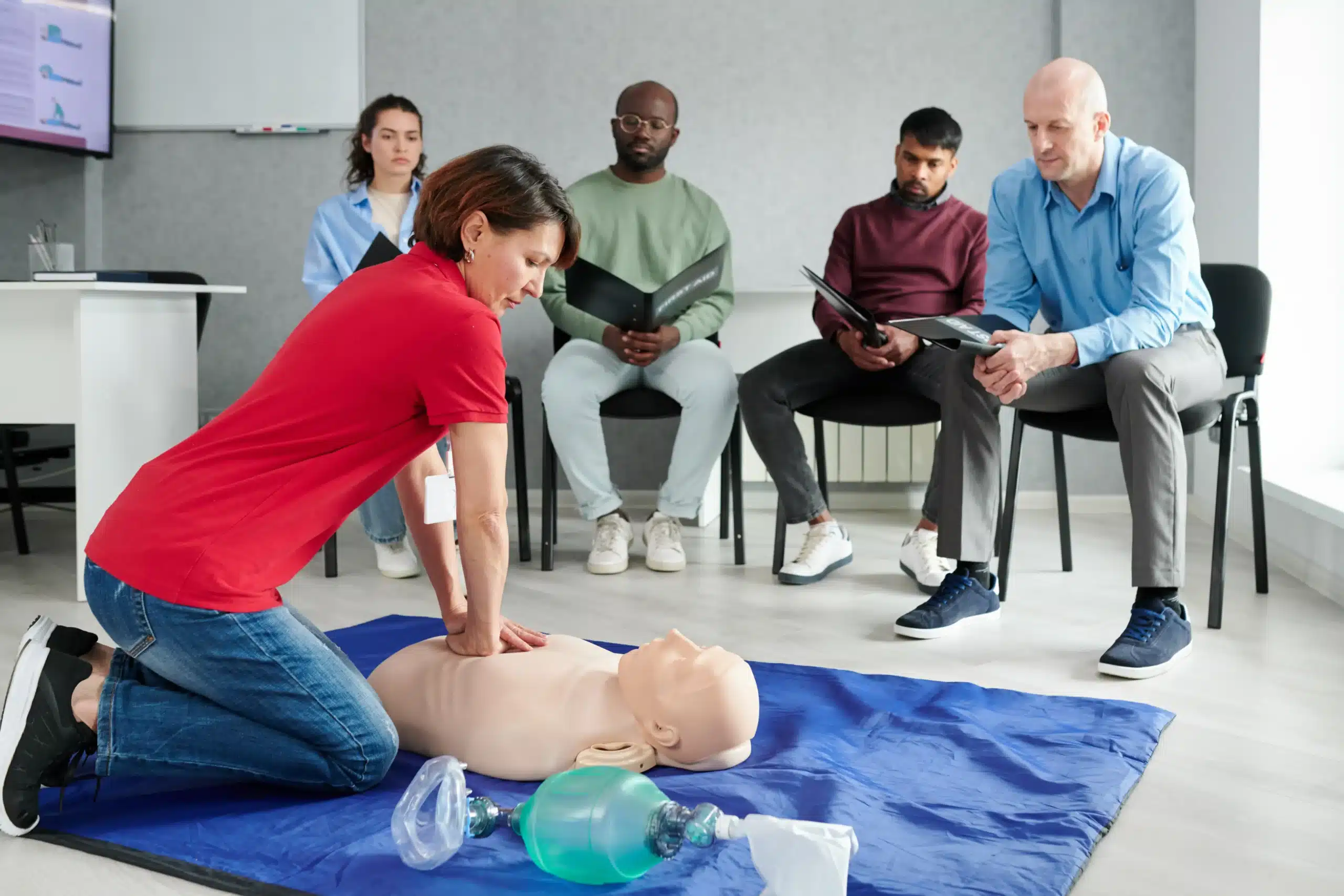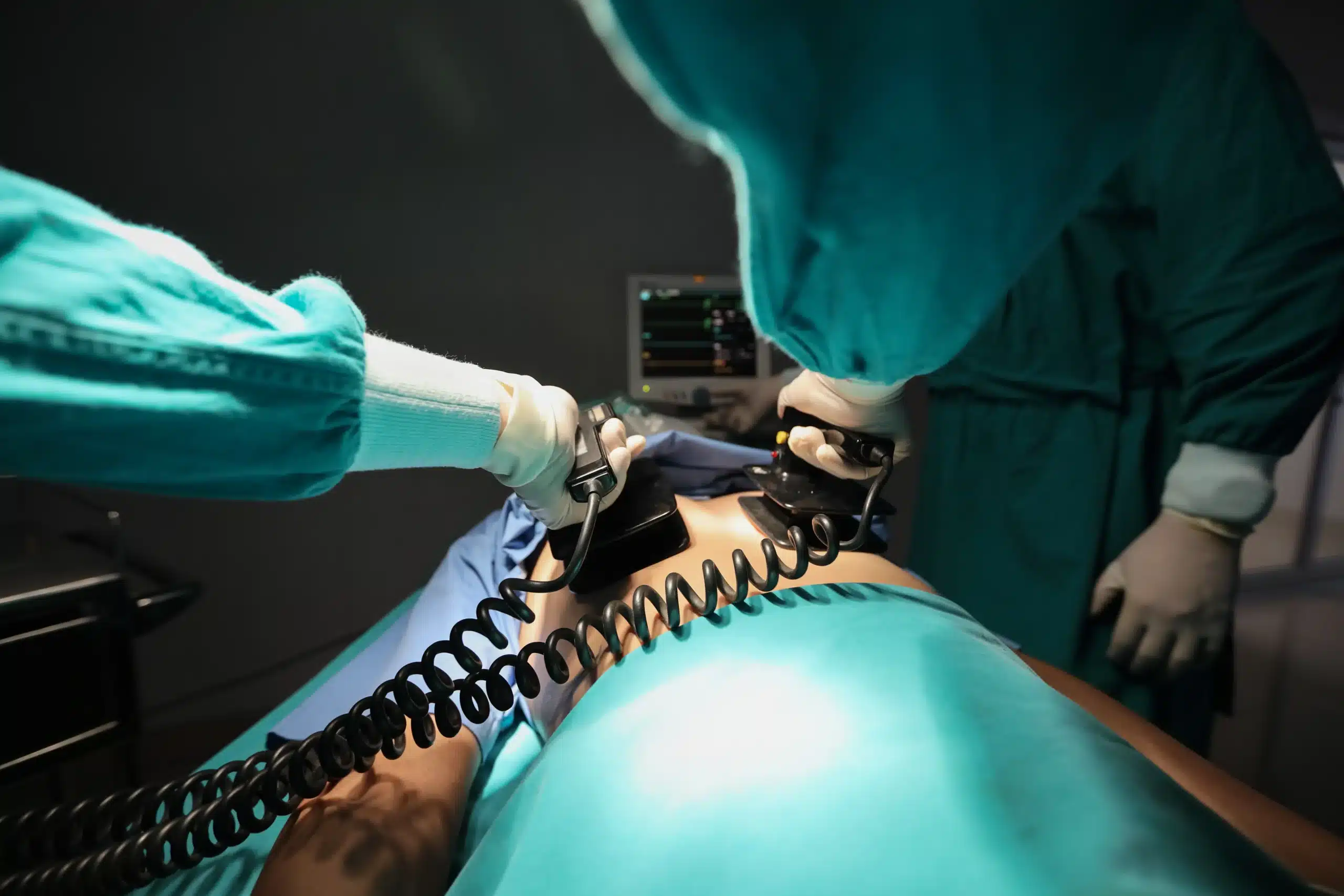Emergencies can happen anytime, anywhere. Would you know what to do if someone near you experienced a sudden cardiac arrest? CPR training in Sunnyvale equips you with the skills and confidence to respond effectively in these critical situations. This comprehensive guide explores the importance of CPR, the different types of training available, and how to choose the right course for your needs. We’ll also discuss the costs associated with CPR training, highlight top providers in Sunnyvale, and address common misconceptions about CPR. Whether you’re a healthcare professional, a childcare provider, or simply someone who wants to be prepared, this guide is your starting point.
Key Takeaways
- CPR skills empower you to save lives: Learning CPR, whether basic or advanced, equips you to respond effectively in emergencies. Explore options like BLS, ACLS, and PALS to find the right fit.
- Select a training format that suits your lifestyle: Balance hands-on practice with scheduling flexibility by choosing in-person, online, or blended learning options.
- Choose a trusted provider for quality training: Prioritize certified instructors, affordable pricing, and convenient class locations. Consider Safety Training Seminars for AHA-certified courses in Sunnyvale.
What is CPR Training?
CPR training equips you with the skills to respond effectively during medical emergencies. This section covers the basics of CPR, who can benefit from training, and addresses common misconceptions.
What is CPR and Why Does it Matter?
CPR, or cardiopulmonary resuscitation, is a lifesaving technique used when someone’s breathing or heartbeat has stopped. It involves chest compressions and, sometimes, rescue breaths. These actions maintain blood flow to the brain and vital organs until professional medical help arrives. Learning CPR empowers you to take immediate action in a crisis, potentially making the difference between life and death. CPR can significantly improve the odds of survival, especially if started immediately.
Who Needs CPR Training?
CPR training is beneficial for everyone, not just medical professionals. While healthcare providers, like doctors and nurses, certainly require this skill, it’s equally valuable for teachers, coaches, parents, and anyone interested in being prepared for emergencies. Consider CPR training if you work with children, are responsible for the safety of others, or simply want the confidence to help in a crisis. Even basic CPR knowledge can make a significant impact. Safety Training Seminars offers a variety of CPR and first-aid courses suitable for all skill levels.
Common CPR Misconceptions
Several myths surround CPR training, often discouraging people from learning this essential skill. One common misconception is that only medical professionals can perform CPR. This isn’t true. Anyone can learn and administer CPR. Another myth is that you must be certified to perform CPR legally. Good Samaritan laws generally protect those who provide CPR in good faith during an emergency, regardless of certification status. Understanding and addressing these misconceptions is crucial for empowering more people to act confidently and effectively in emergencies. Don’t let these myths prevent you from learning a skill that could save a life. For more information, read our blog post on common CPR myths.
CPR Training Classes in Sunnyvale
Sunnyvale offers a variety of CPR training classes to equip you with the lifesaving skills you need. Whether you’re a healthcare professional, a childcare provider, or simply a concerned citizen, there’s a course that fits your requirements. Let’s explore some of the key CPR training classes available in Sunnyvale:
Basic Life Support (BLS)
Basic Life Support (BLS) training is crucial for healthcare providers and other professionals who might need to respond to medical emergencies. This BLS course covers core skills like high-quality CPR for adults, children, and infants, automated external defibrillator (AED) use, and relief of choking. It emphasizes early recognition and effective interventions to improve patient outcomes. BLS certification demonstrates a commitment to providing timely and appropriate care during life-threatening situations. For healthcare providers looking for efficient recertification, consider the RQI program.
Advanced Cardiovascular Life Support (ACLS)
Advanced Cardiovascular Life Support (ACLS) training builds upon the foundation of BLS. Designed for healthcare professionals who manage cardiovascular emergencies, ACLS covers advanced interventions, effective team dynamics, and clear communication during resuscitation efforts. This course equips participants with the knowledge and skills to handle complex cardiac arrest scenarios and other cardiovascular emergencies.
Pediatric Advanced Life Support (PALS)
Pediatric Advanced Life Support (PALS) focuses on the specific needs of infants and children facing critical illness. This specialized training is essential for healthcare providers, childcare providers, and others who work with young patients. PALS emphasizes early recognition and intervention in pediatric emergencies, covering topics like respiratory distress, shock, and cardiac arrest in infants and children. The course provides a systematic approach to pediatric assessment and treatment, empowering professionals to deliver the best possible care in these critical situations.
First Aid and CPR
Combining first aid and CPR training provides a comprehensive skill set for responding to various emergencies. This course covers essential first aid techniques for common injuries like cuts, burns, and fractures, as well as CPR for adults, children, and infants. Learning how to use an AED is also a key component of this combined training. This comprehensive approach prepares individuals to handle both immediate first aid needs and life-threatening situations requiring CPR. It’s a valuable asset for anyone who wants to be prepared to help in an emergency. Consider joining a discount group class to save on costs. Safety Training Seminars is committed to offering the lowest prices in Santa Clara County.
Choose Your CPR Training Format
Deciding on the right CPR training format is a personal choice. Think about your learning style, schedule, and budget as you weigh the pros and cons of each option. Here’s a breakdown to help you decide what’s best for you:
In-Person Training: Pros and Cons
In-person CPR training offers a structured learning environment with face-to-face interaction with a certified instructor. This format excels at providing hands-on practice and immediate feedback, essential for mastering CPR techniques. As Safety Training Seminars points out in their guide to Sunnyvale CPR classes, in-person classes allow participants to practice skills in real-time, ensuring they’re fully prepared for real-life emergencies. However, the biggest drawback is scheduling. In-person classes require a specific time commitment, which can be tricky if you have a busy schedule.
Online Courses: Advantages and Limitations
Online CPR courses offer unparalleled flexibility and convenience. You can learn at your own pace, anytime, anywhere. This format is perfect for those who prefer self-directed learning or have demanding schedules. A guide to CPR training in Sunnyvale highlights how online options cater to diverse needs and schedules. However, online courses often lack the hands-on practice crucial for effective CPR. While some online courses may offer simulations, they don’t fully replicate working with a mannequin and receiving real-time feedback.
Blended Learning: Benefits
Blended learning combines the best aspects of online and in-person training. You’ll typically complete the theoretical coursework online at your own pace, then attend a shorter in-person skills session. The American Heart Association’s Heartsaver® CPR/AED Blended Learning course is a great example of this approach. It allows you to learn the material online and then solidify your skills with focused, in-person practice. This format is often a cost-effective choice, providing a comprehensive learning experience. It’s a smart way to balance convenience with the hands-on training needed for effective CPR.
CPR Training Costs in Sunnyvale
CPR training is an investment in lifesaving skills, and understanding the costs is an important first step. Several factors influence the overall price, so let’s break them down.
Factors Affecting CPR Costs
The cost of CPR training in Sunnyvale varies based on several key elements. The type of course you choose plays a significant role. A basic CPR course will typically be less expensive than more advanced certifications like ACLS or PALS. The course format also matters. In-person training often costs more than online courses because of the hands-on instruction and personalized feedback from certified instructors. Many CPR training providers in Sunnyvale, including Safety Training Seminars, offer group discounts, which can significantly lower the cost per person. Finally, remember that some providers include supplemental materials, like a CPR pocket mask, in their course fees.
Average Prices for CPR Courses
While prices can fluctuate, having a general idea of the cost range is helpful. The American Heart Association (AHA) Heartsaver® CPR/AED Blended Learning course, which combines online learning with a 4-hour in-person skills session, is often priced around $65 in Sunnyvale. More specialized courses, such as BLS for healthcare providers, might range from $75 to $95. Check with specific providers like Safety Training Seminars for their most up-to-date pricing and any available discounts. Safety Training Seminars is known for offering competitive pricing in Santa Clara County, making it a good starting point in your search.
Benefits of CPR Certification
Beyond the cost, consider the invaluable benefits of CPR certification. Proper CPR training empowers individuals to provide immediate, lifesaving care in emergencies. It equips you with the skills and confidence to respond effectively until professional medical help arrives. After completing your CPR course with Safety Training Seminars, you’ll receive an American Heart Association (AHA) certification card valid for two years. This nationally recognized certification demonstrates your commitment to safety and can be a valuable asset personally and professionally. Whether you’re a parent, teacher, healthcare worker, or simply someone who wants to be prepared, knowing CPR can make a profound difference.
Qualified CPR Instructors in Sunnyvale
Finding the right CPR instructor is crucial for an effective learning experience. Look for certified instructors with a deep understanding of CPR techniques and a passion for teaching. Here’s what to consider when choosing a CPR instructor in Sunnyvale:
American Heart Association (AHA) Certification
The American Heart Association (AHA) sets the standard for CPR training. Choosing AHA-certified instructors ensures you receive high-quality, evidence-based instruction. Safety Training Seminars offers a range of AHA-certified courses, including CPR, Basic Life Support (BLS), Advanced Cardiovascular Life Support (ACLS), and Pediatric Advanced Life Support (PALS). This commitment to AHA guidelines means their instructors stay up-to-date with the latest knowledge and techniques.
Instructor Experience and Expertise
Beyond certification, consider the instructor’s experience and teaching style. Safety Training Seminars is a woman-owned AHA Training Center, committed to providing high-quality instruction. Experienced instructors can offer practical insights, answer your questions thoroughly, and create a comfortable learning environment. Look for instructors who are passionate about teaching and dedicated to helping you master these life-saving skills. Their focus on high-quality, evidence-based training makes a real difference in your learning experience.
Register for CPR Training in Sunnyvale
Ready to learn CPR? Great! This section walks you through registering, highlights available discounts, and explains options for group training. Safety Training Seminars makes signing up for a CPR class straightforward, so you can focus on gaining these lifesaving skills.
Steps to Register
Registering for a class is easy. Safety Training Seminars offers a range of American Heart Association (AHA) certified courses, including CPR, Basic Life Support (BLS), Advanced Cardiovascular Life Support (ACLS), and Pediatric Advanced Life Support (PALS). Browse the course catalog and select the best fit for your needs. Classes are available daily, with convenient online and in-person options, including blended learning. Once you’ve chosen your course, select a date and time, and complete the online registration form. You’ll receive a confirmation email with all the details.
Discounts and Promotions
Safety Training Seminars is committed to providing affordable training and offers a low-price guarantee. Check the website for current promotions on CPR, BLS, ACLS, PALS, and First Aid/CPR courses and be sure to inquire about discounts when you register.
Group Training Options
Need CPR training for your team, school, or community group? Safety Training Seminars offers group discounts on CPR and first-aid courses. This makes it more convenient (and cost-effective) for groups like teachers, coaches, and community members to learn together. Contact Safety Training Seminars directly to discuss your group’s specific needs and arrange a training session.
Top CPR Training Providers in Sunnyvale
Finding the right CPR training provider is crucial for a positive and effective learning experience. Here’s a rundown of some reputable options in Sunnyvale:
Safety Training Seminars
Safety Training Seminars has been a trusted provider of CPR and first aid training since 1989. They offer American Heart Association (AHA) certified courses, including CPR, BLS, ACLS, PALS, and First Aid classes right here in Sunnyvale. As a woman-owned business, they focus on high-quality training with classes available daily, both online and in person, including blended learning options. Their certifications are widely accepted, making them a solid choice. Plus, they offer a low-price guarantee within Santa Clara County. Certification cards are valid for two years.
American Heart Association (AHA)
The American Heart Association (AHA) itself offers the Resuscitation Quality Improvement (RQI) program, a streamlined way for healthcare professionals in Sunnyvale to maintain their BLS, ACLS, and PALS certifications. The AHA’s training programs are highly respected and recognized throughout the medical community. Safety Training Seminars offers more information on the RQI program on their website.
American Red Cross Silicon Valley Chapter
The American Red Cross Silicon Valley Chapter provides various CPR and first aid training courses. They’re known for comprehensive programs catering to different needs, from workplace safety to community education. Their courses aim to equip participants with the skills to handle emergencies effectively. The Santa Clara County Fire Department website offers more information on Red Cross training in the area.
Bay Area CPR
Bay Area CPR offers a range of AHA-certified CPR and first aid classes in Sunnyvale, conveniently located near Palo Alto and Santa Clara. They offer BLS, ACLS, PALS, NRP, and combined CPR/First Aid courses, plus specialized options like EMSA Pediatric CPR & First Aid and EMSA Health & Safety. This variety makes it easy to find the right course for your needs. Learn more about their course offerings on their website.
Santa Clara County Fire Department
The Santa Clara County Fire Department (SCCFD) offers a few different CPR/AED training options, ensuring community members have access to these essential life-saving skills. Courses are registered and scheduled through Eventbrite, simplifying the enrollment process. Find a CPR class near you through their website.
Related Articles
- Why CPR is Crucial in Healthcare
- CPR Certification in San Jose: A Practical Guide – Sunnyvale CPR Classes
- Debunking Common CPR Myths
- CPR Courses in Sunnyvale: Your Ultimate Guide – Sunnyvale CPR Classes
- Online CPR Classes in Sunnyvale: A Complete Guide
Frequently Asked Questions
What’s the difference between CPR and First Aid?
CPR specifically addresses life-threatening situations where someone’s breathing or heartbeat has stopped. First Aid, on the other hand, covers a broader range of injuries and illnesses, from minor cuts and burns to more serious conditions like fractures and allergic reactions. While distinct, they often complement each other, providing a comprehensive approach to emergency care. Many courses combine CPR and First Aid training, equipping you to handle various situations.
How long is a typical CPR certification valid for?
CPR certifications are typically valid for two years. This timeframe ensures your knowledge and skills remain current with the latest guidelines. Renewal courses are readily available, making it easy to maintain your certification and stay prepared for emergencies. Check with your specific training provider, like Safety Training Seminars, for their renewal policies and available courses.
Do I need to be a healthcare professional to take a CPR class?
Absolutely not! CPR training is valuable for everyone, regardless of profession. While it’s essential for healthcare providers, it’s equally beneficial for teachers, parents, coaches, and anyone who wants to be prepared for an emergency. Knowing CPR can empower you to save a life, regardless of your background.
What if I’m nervous about performing CPR in a real emergency?
It’s completely normal to feel some apprehension about using CPR in a real-life situation. That’s why quality training is so important. A good CPR course will not only teach you the techniques but also build your confidence through practice and realistic scenarios. Remember, even imperfect CPR is better than no CPR. Your willingness to act can make a significant difference.
How do I choose the right CPR class for me?
Consider your schedule, learning style, and specific needs. If you prefer a structured environment and hands-on learning, an in-person class might be best. If flexibility is key, an online or blended learning option could be a better fit. Also, think about the type of certification you need. A basic CPR course is suitable for most people, while healthcare providers might require BLS, ACLS, or PALS certification. Look for reputable providers like Safety Training Seminars, which offer various courses to meet different needs.
